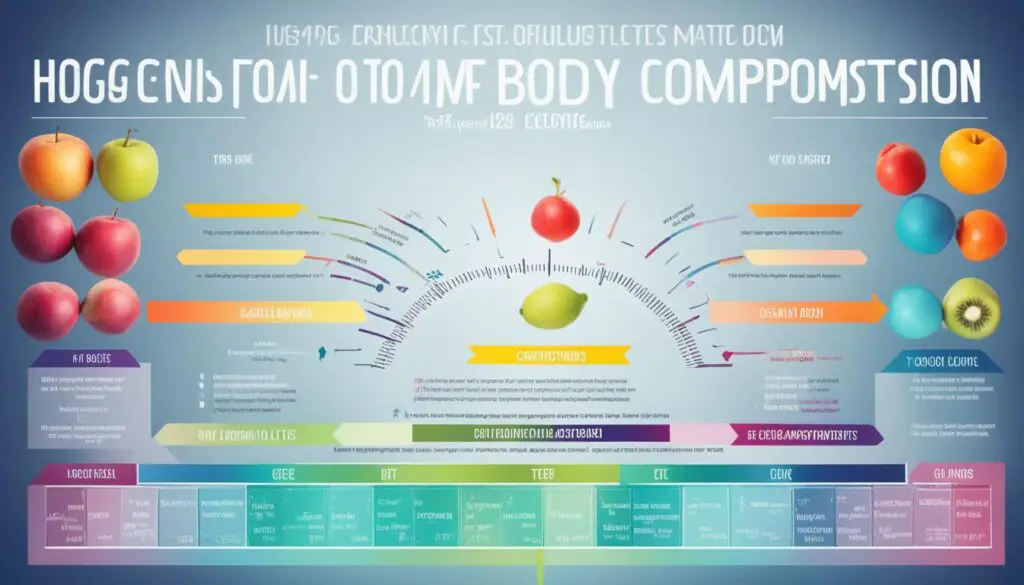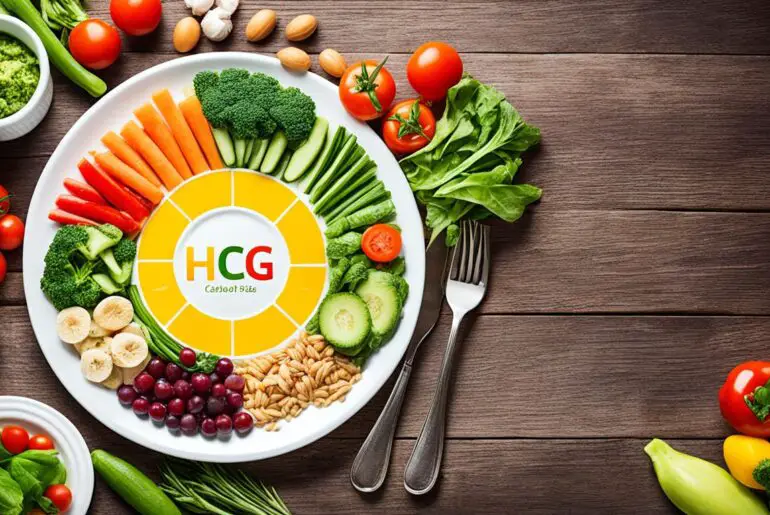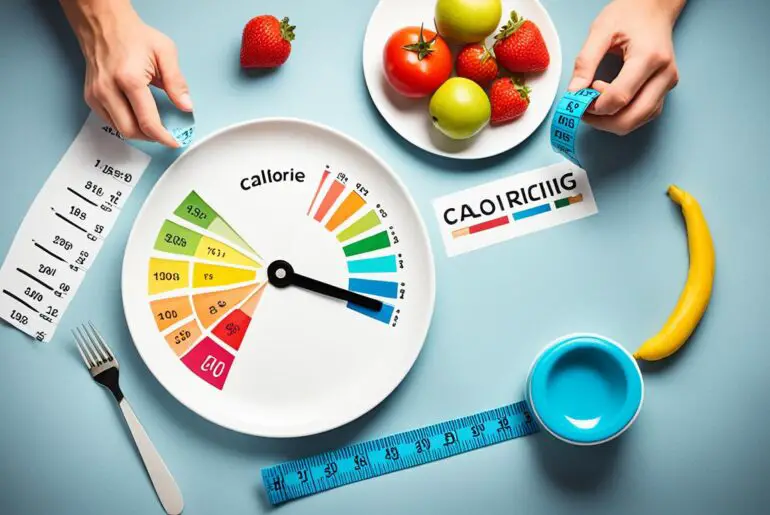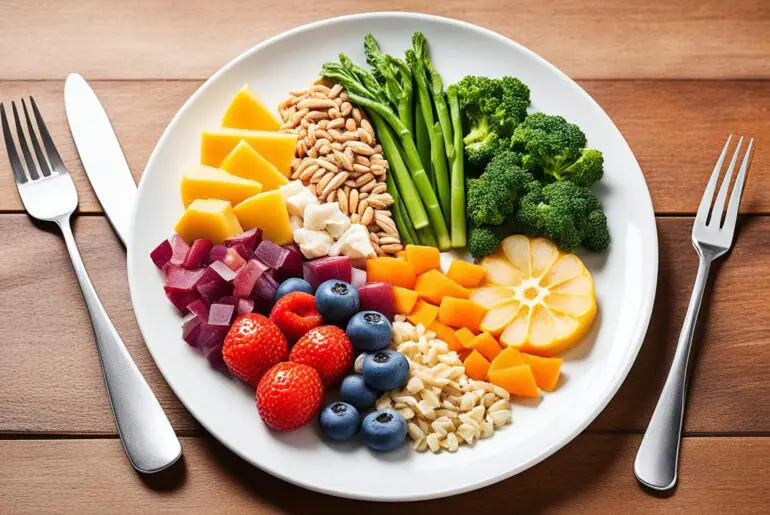When it comes to weight loss, there are countless diets and methods claiming to be the ultimate solution. One such method that has gained popularity is the HCG diet, which involves a combination of ultra-low-calorie intake and HCG hormone injections. But does the calorie count in the HCG diet really make a difference in maximizing weight loss?
The HCG diet promises fast weight loss of 1-2 pounds per day without hunger. Advocates of the diet claim that the hCG hormone boosts metabolism, reduces hunger, and helps with fat loss. However, the FDA has deemed the HCG diet illegal and dangerous due to concerns about its safety and effectiveness.
In this article, we will explore the function of HCG in the body, its alleged role in weight loss, the effect on body composition, the rules of the HCG diet, and the safety considerations associated with it. By the end, you’ll have a better understanding of whether HCG calorie counting truly maximizes weight loss or if there are alternative methods worth considering.
Key Takeaways:
- The HCG diet promises rapid weight loss through a combination of ultra-low-calorie intake and HCG hormone injections.
- There are mixed opinions regarding the effectiveness of HCG calorie counting in achieving weight loss goals.
- The FDA has deemed the HCG diet illegal and dangerous, raising concerns about its safety and potential side effects.
- Weight loss achieved on the HCG diet is primarily due to the extreme calorie restriction, not the hCG hormone itself.
- Exploring safer and more sustainable weight loss methods is recommended, and it’s important to consult with healthcare professionals for personalized advice.
What is hCG?
hCG, or human chorionic gonadotropin, is a hormone produced in the early stages of pregnancy. It plays a crucial role in supporting pregnancy and is also used as a marker in home pregnancy tests. Additionally, hCG is utilized in fertility treatments to stimulate ovulation in women.
Although hCG’s role in pregnancy and fertility treatment is well-established, it gained attention in the weight loss industry when British doctor Albert Simeons proposed it as a potential tool for weight loss in 1954.
The Use of hCG in Pregnancy and Fertility Treatment
“During pregnancy, the placenta produces hCG to help maintain the production of important hormones, such as progesterone. This is crucial for supporting the healthy growth of the uterus and the developing fetus.”
Home pregnancy tests detect the presence of hCG in urine, providing women with a reliable method of confirming pregnancy. In fertility treatments, hCG injections are administered to stimulate ovulation, increasing the chances of successful conception.
hCG as a Weight Loss Tool
The concept of using hCG for weight loss involves combining a low-calorie diet with hCG hormone supplementation. Proponents of this approach claim that hCG helps boost metabolism, promote fat loss, and reduce hunger, facilitating rapid weight loss.
“However, it’s important to note that there is significant controversy surrounding the use of hCG for weight loss, with concerns raised by regulatory authorities and healthcare professionals.”
While some individuals may experience weight loss on the hCG diet, studies have shown that the calorie restriction associated with the diet is the primary factor responsible for the weight loss, rather than the hCG hormone itself. The effectiveness and safety of the hCG diet for weight loss remain questionable.
As with any weight loss program, it is essential to consult with a healthcare professional before considering the use of hCG or any other dietary intervention.
hCG’s function in the body

During pregnancy, the body undergoes numerous changes to support the development of the fetus. One crucial hormone involved in this process is hCG, or human chorionic gonadotropin. hCG is a protein-based hormone produced by the placenta, starting from the early stages of pregnancy.
The primary function of hCG is to maintain the production of important hormones, such as progesterone, which are essential for the healthy growth of the uterus and fetus. Progesterone is responsible for preparing the uterus for implantation and maintaining the thickened uterine lining to support the developing embryo. Without adequate levels of hCG, hormone production would decrease, potentially leading to complications and pregnancy loss.
Throughout the first trimester of pregnancy, hCG levels continue to rise, peaking around 10-12 weeks. After this period, the levels gradually decline. The decline in hCG levels is normal and indicates that the placenta has developed enough to take over the production of essential hormones to support the pregnancy.
Here is a brief overview of the function of hCG in the body:
- Stimulates the production of other hormones, such as progesterone, to support the healthy growth of the uterus and fetus.
- Helps maintain the thickened uterine lining to provide a suitable environment for the embryo to implant and develop.
- Supports the development of the placenta, which is responsible for supplying nutrients and oxygen to the growing fetus.
- Indicates the presence of pregnancy and is used as a marker in home pregnancy tests.
- Assists in the regulation of maternal metabolism, ensuring adequate energy supply for both the mother and the developing baby.
It’s important to note that hCG plays a significant role during pregnancy and may not have the same functions outside of this context. While hCG injections have been popularized as a weight loss tool, there is limited scientific evidence to support their efficacy for weight management outside of pregnancy.
hCG helps maintain the production of important hormones, such as progesterone, to support the healthy growth of the uterus and fetus.
hCG and weight loss
Proponents of the hCG diet claim that it boosts metabolism and helps with fat loss while reducing hunger. However, numerous studies have concluded that weight loss achieved through the hCG diet is primarily due to the drastic calorie restriction, rather than the hCG hormone itself. The hCG hormone does not significantly reduce hunger.
The mechanism for weight loss with the hCG diet can be attributed to the severe calorie restriction of around 500 calories per day. By drastically cutting the caloric intake, the body is forced to utilize stored fat for energy, resulting in weight loss.
Studies examining the effectiveness of the hCG diet have shown mixed results. While some studies report short-term weight loss, they also highlight the importance of the low-calorie diet as the main driver of weight loss. The hCG hormone alone does not seem to have a significant impact on weight loss outcomes.
Furthermore, hunger reduction is not a proven benefit of hCG supplementation. While some individuals may experience reduced hunger during the hCG diet, this is likely a result of the low-calorie intake rather than the hormone itself.
It is important to note that the hCG diet is not without its risks and controversies. The FDA considers the hCG diet illegal and dangerous, and there are concerns about potential side effects, such as headaches, depression, fatigue, and even more serious complications like blood clots. Consulting with a healthcare professional is crucial before considering the hCG diet.
“Weight loss achieved through the hCG diet is primarily attributed to the drastic calorie restriction rather than the hCG hormone itself.”
Considering the limitations and potential risks associated with the hCG diet, it is advisable to explore alternative weight loss methods that prioritize overall health and sustainable results. Adopting a balanced diet, regular exercise routine, and seeking guidance from healthcare professionals can lead to safe and effective weight loss.
The hCG Diet and Hunger Reduction
While proponents of the hCG diet suggest that the hormone helps reduce hunger, scientific evidence does not support this claim. Studies have failed to demonstrate a significant hunger reduction with hCG supplementation alone. Instead, the low-calorie intake prescribed in the hCG diet is responsible for mitigating hunger pangs.
Although individual experiences may vary, hunger reduction on the hCG diet can be attributed to the extreme calorie restriction rather than the hCG hormone itself. To achieve weight loss goals, it is essential to focus on the calorie deficit created by the low-calorie diet rather than relying solely on the hCG hormone for appetite suppression.
hCG’s effect on body composition

When following the hCG diet, which involves severely reducing calorie intake, there can be significant effects on body composition. One of these effects is the potential loss of muscle mass. Calorie restriction, especially at such low levels as in the hCG diet, can lead to the breakdown of muscle tissue for energy.
This loss of muscle mass can be detrimental, as it not only affects physical appearance but also has implications for overall health and metabolism. Muscle plays a crucial role in burning calories and maintaining a healthy metabolic rate. When muscle mass is decreased, the body’s metabolism may slow down, making it harder to continue losing weight.
Advocates of the hCG diet claim that the hCG hormone can prevent muscle loss and metabolic slowdown. However, there is no scientific evidence to support these claims. Studies have shown that the preservation of muscle mass during low-calorie diets is challenging, regardless of the inclusion of hCG hormone.
Moreover, low-calorie diets, like the hCG diet, are generally not effective for long-term weight loss. While rapid weight loss may occur initially, it is often unsustainable and can lead to weight regain once normal eating patterns resume.
To maintain weight loss and preserve muscle mass, it is important to focus on balanced nutrition and regular exercise rather than relying on extreme calorie restriction. By following sustainable and well-rounded dietary and exercise practices, individuals can achieve lasting weight loss results and promote overall health.
It is essential to approach weight loss with a focus on overall well-being, rather than relying on fad diets that can potentially harm our bodies. By adopting lifestyle changes that promote a balanced diet, regular physical activity, and a positive mindset, we can achieve sustainable weight loss and maintain a healthy body composition.
The Effects of Low-Calorie Diets on Body Composition
Low-calorie diets, such as the hCG diet, can have a significant impact on body composition. Let’s explore the effects of these diets on different aspects:
| Effect | Explanation |
|---|---|
| Decreased muscle mass | Severely restricting calorie intake can lead to the breakdown of muscle tissue for energy, resulting in a loss of muscle mass. |
| Metabolic slowdown | As muscle mass decreases, the body’s metabolism may slow down, making it harder to continue losing weight. |
| Decreased energy levels | Low-calorie diets can cause a decrease in energy levels, as the body does not receive sufficient fuel to sustain normal activities. |
| Nutrient deficiencies | Extreme calorie restriction can lead to limited nutrient intake, potentially resulting in deficiencies of essential vitamins and minerals. |
To mitigate these effects, a well-rounded approach to weight loss is vital. Incorporating strength training exercises can help preserve muscle mass while promoting fat loss. Additionally, focusing on nutrient-dense foods and maintaining an appropriate calorie balance is key to supporting overall health and achieving sustainable weight loss goals.
In summary, the hCG diet and other low-calorie diets can lead to muscle loss and metabolic slowdown. Proponents of the hCG diet claim that it prevents these negative effects, but scientific evidence does not support these claims. To achieve long-term weight loss and maintain a healthy body composition, it is advisable to prioritize a balanced diet, regular exercise, and overall well-being.
The rules of the hCG diet
The hCG diet consists of three distinct phases: the loading phase, the weight loss phase, and the maintenance phase. Each phase has its own guidelines and objectives to help achieve successful weight loss results.
Loading Phase
The loading phase marks the beginning of the hCG diet journey. During this phase, participants are encouraged to consume high-fat and calorie-rich foods for about two days. This phase aims to help prepare the body for the upcoming calorie restriction and initiate the fat-burning process.
Weight Loss Phase
The weight loss phase is the core of the hCG diet. It typically lasts anywhere from three to six weeks. During this phase, participants follow a very low-calorie diet, usually consisting of only around 500 calories per day. The hCG hormone is also administered, either through injections, drops, or pellets. The combination of the strict calorie restriction and hCG hormone is believed to help suppress hunger and target stored fat for energy.
Meals during the weight loss phase primarily consist of lean protein sources such as white fish, chicken breast, or lean beef. Vegetables, fruits, and a small portion of bread are also allowed. However, it’s important to avoid foods high in fats, such as butter and oils, and added sugars.
Maintenance Phase
After completing the weight loss phase, participants enter the maintenance phase. This phase is crucial for stabilizing weight loss and transitioning to a more sustainable lifestyle. Calorie intake gradually increases, and a wider variety of foods can be reintroduced. The maintenance phase typically lasts for about three weeks and focuses on establishing healthy eating habits and preventing weight regain.
It is worth noting that hCG meal plans can vary, and it is essential to consult with a healthcare professional or a registered dietitian to create a personalized plan tailored to individual needs and goals.
The following table provides a summarized overview of the hCG diet phases:
| Phase | Description |
|---|---|
| Loading Phase | Consumption of high-fat and calorie-rich foods to initiate fat burning |
| Weight Loss Phase | Very low-calorie diet (around 500 calories per day) combined with hCG hormone administration |
| Maintenance Phase | Gradual reintroduction of foods, establishment of healthy eating habits to stabilize weight loss |
Scam products on the market

When searching for hCG products, it is important to be aware of the presence of fake and misleading options in the market. Many products are marketed as homeopathic hCG but do not actually contain any genuine hCG hormone. These products often make unverified claims about their effectiveness for weight loss.
Genuine hCG, in the form of injections, can only be obtained through a prescription. These injections are typically administered under the supervision of a healthcare professional who can provide guidance and monitor progress. Using authentic hCG ensures you are receiving the appropriate dosage and quality for your weight loss journey.
The U.S. Food and Drug Administration (FDA) has raised concerns about the safety and efficacy of hCG products. It is crucial to avoid unregulated products and those with unknown ingredients. The FDA closely regulates medications and treatments to protect consumer health and ensure their effectiveness.
To avoid falling victim to fake hCG products, it is recommended to consult with a healthcare professional before starting any weight loss program that involves hCG. They can provide you with accurate information and guide you towards approved and monitored alternatives.
“Ensuring you are using genuine hCG products is essential for a safe and effective weight loss journey.”
Genuine hCG vs. Fake hCG Products
| Genuine hCG Products | Fake hCG Products |
|---|---|
| Obtained with a prescription | No prescription required |
| Administered under medical supervision | Self-administered |
| Regulated by the FDA | Not regulated or approved |
| Potentially covered by insurance | Typically not covered by insurance |
| Monitored for safety and efficacy | Not monitored or tested |
It is important to prioritize your safety and health when embarking on a weight loss journey. By choosing genuine hCG products, you can be confident in the quality and effectiveness of your treatment. Consult with a healthcare professional for personalized advice and guidance to ensure your weight loss efforts are supported in a safe and regulated manner.
Safety and side effects

While the hCG diet may promise fast weight loss, it is important to consider the safety and potential side effects of this approach. The U.S. Food and Drug Administration (FDA) has not approved hCG as a weight loss aid and has raised concerns about its safety.
Like any medical intervention, the hCG diet has its risks and side effects. Common side effects reported by participants include headaches, depression, and fatigue. However, more serious complications can occur, such as blood clots, which can be life-threatening.
I cannot stress enough the importance of consulting with a doctor or healthcare professional before starting the hCG diet. They can provide guidance, assess your individual health situation, and help you make an informed decision about the diet’s potential risks and benefits.
Risks of the hCG Diet
The hCG diet carries various risks that need to be considered:
- Blood clots: In some cases, the hCG diet has been associated with an increased risk of blood clots. Blood clots can lead to serious health complications and require immediate medical attention.
- Hormonal imbalances: The hCG hormone can interfere with the body’s natural hormone balance, which may have long-term consequences for overall health and well-being.
- Muscle loss: The drastic calorie restriction of the hCG diet can lead to significant muscle loss, which can adversely affect metabolism and overall body composition.
- Nutritional deficiencies: The limited food choices and low-calorie intake on the hCG diet may result in nutritional deficiencies, which can lead to a variety of health issues.
It is crucial to weigh the potential risks of the hCG diet against the desired weight loss outcomes. There are alternative weight loss methods available that are safer and more sustainable in the long run.
| Side Effects | Risks |
|---|---|
| Headaches | Blood clots |
| Depression | Hormonal imbalances |
| Fatigue | Muscle loss |
| Nutritional deficiencies |
Consulting with a medical professional is crucial before embarking on any weight loss program, especially one as controversial as the hCG diet. Your health and well-being should always be the top priority.
HCG Diet Program for Different Weight Loss Goals

In order to achieve your desired weight loss goals, the duration of the HCG program can vary. Whether you are looking to lose 10 pounds or more, there is a recommended program duration that can help you reach your target weight.
If your weight loss goal is 10 pounds or less, a 20-day program is recommended. This program consists of different phases that are designed to optimize your weight loss journey. It starts with a loading phase, where you consume a high-calorie diet for two days to prepare your body for the calorie-restricted phase. After the loading phase, you enter the weight loss phase, where you restrict your calorie intake to around 500 calories per day and receive HCG injections. This phase typically lasts for 16 days. Finally, there is a maintenance phase, which lasts for 2 days, during which you increase your calorie intake slightly while still avoiding certain foods.
For individuals who need to lose more than 15 pounds, a 40-day program is advised. This longer program provides additional time for weight loss and further dietary adjustments to sustain your progress. The program structure remains the same, with a loading phase, weight loss phase, and maintenance phase. However, the duration of each phase is extended to accommodate the larger weight loss goal.
In some cases, individuals who want to lose more than 30 pounds may need to undergo a second series of the HCG program after a 4-week break. This allows your body to reset and prepare for another round of weight loss.
It is important to note that the HCG program is not a one-size-fits-all solution. Each individual’s weight loss journey is unique, and it is recommended to consult with a healthcare professional to determine the appropriate program duration based on your specific goals and needs.
HCG Program Duration Guide
| Weight Loss Goal | Program Duration |
|---|---|
| 10 pounds or less | 20-day program |
| More than 15 pounds | 40-day program |
| More than 30 pounds | 40-day program + 4-week break + additional series |
Consult with a healthcare professional to determine the appropriate program duration based on your weight loss goals and individual circumstances.
Conclusion
After reviewing the HCG diet, it is clear that the promise of rapid weight loss is primarily due to the extreme calorie restriction, rather than the hCG hormone itself. Many studies have shown that the drastic reduction in calorie intake is responsible for the weight loss observed during the diet. Additionally, there are safety concerns surrounding the use of hCG for weight loss, as it is not approved by the FDA for this purpose.
As an alternative, it is advisable to explore other weight loss methods that are safer and more sustainable in the long term. Consulting with healthcare professionals can provide personalized guidance and advice, taking into account individual needs and goals. They can recommend evidence-based approaches that prioritize overall health and well-being.
Ultimately, achieving lasting weight loss requires a comprehensive and balanced approach that includes regular physical activity, a healthy and balanced diet, and lifestyle modifications. By focusing on long-term changes, individuals can achieve their weight loss goals in a safe and sustainable manner, promoting better overall health and well-being.
FAQ
What is the hCG diet?
The hCG diet is a weight loss program that combines a very low-calorie intake of around 500 calories per day with hCG hormone injections.
Is the hCG diet safe?
The FDA deems the hCG diet illegal and dangerous. There are safety concerns, including side effects such as headaches, depression, and fatigue.
Does hCG hormone reduce hunger?
No, numerous studies have concluded that weight loss achieved through the hCG diet is primarily due to extreme calorie restriction, not the hCG hormone. The hCG hormone does not significantly reduce hunger.
What are the side effects of the hCG diet?
Side effects of the hCG diet can include headaches, depression, fatigue, and in some cases, more serious complications such as blood clots.
How long is the hCG program?
The duration of the hCG program depends on weight loss goals. For those needing to lose 10 pounds or less, a 20-day program is recommended. For those needing to lose more than 15 pounds, a 40-day program is advised. Individuals who want to lose more than 30 pounds may need a second series after a 4-week break.
What are the phases of the hCG diet?
The hCG diet is divided into three phases: the loading phase, weight loss phase, and maintenance phase. During the weight loss phase, participants follow a very low-calorie diet of around 500 calories per day and take hCG. Meals typically consist of lean protein, vegetables, bread, and fruit.
Many hCG products marketed as homeopathic do not contain any real hCG. Genuine hCG, in the form of injections, can only be obtained with a prescription. It is advised to avoid unregulated and unknown ingredient-containing products.
Is the hCG diet effective for long-term weight loss?
No, low-calorie diets like the hCG diet are not effective for long-term weight loss. Severely reducing calorie intake can lead to decreased muscle mass and a slowdown in metabolism.
Is hCG approved by the FDA for weight loss?
No, the FDA has not approved hCG as a weight loss aid. The FDA has raised concerns about the safety of hCG products.
Are there alternative weight loss methods?
Yes, there are alternative weight loss methods that are safer and more sustainable. It is recommended to explore these options and consult with healthcare professionals for personalized advice and guidance.




